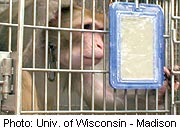
THURSDAY, Sept. 30 (HealthDay News) — Your dog, like most other animals, can’t look in a mirror and figure out the furry thing with eyes is her own reflection. But Wisconsin researchers have just proven that rhesus macaque monkeys can — and are delighted when they do.
There’s more to this discovery than monkey entertainment: the research could give scientists more insight into how humans (the most mirror-happy species of all) developed an advanced sense of self-awareness.
The finding suggests that self-awareness evolved “much further back” than scientists had assumed, said study co-author Luis C. Populin, an associate professor at the University of Wisconsin-Madison.
“Perhaps the way in which it evolved over time was more of a progressive process, and this function didn’t necessarily appear abruptly,” Populin added.
Until now, only a few species — including humans, elephants, dolphins, chimpanzees and magpies — have shown they are able to look at their images in a mirror and figure out that they’re looking at themselves, Populin said.
Other kinds of animals may detect that there’s an animal in a mirror but think it’s another one and try to play with it or defend themselves against it.
Why does this kind of self-awareness matter? Because it allows animals to gain a greater sense of where they fit into the world, Populin said. “All of a sudden you start exploring yourself and who you are and how you look. Clearly, it’s very important for humans,” he said.
It may play other roles, too. Populin said it’s possible that self-awareness may allow animals to gauge how big they are compared to the rest of the world. (Small dogs who try to pick fights with huge dogs, for example, may lack this ability.)
Researchers test self-awareness by putting a dot on an animal and then watching to see if it can use a mirror to figure out that the dot is on itself.
In the new study, researchers realized that the monkeys did figure out how to use mirrors after the animals had been given a head implant to allow brain monitoring. In fact, all five monkeys in the study saw their bodies in a full-length mirror and began examining their genitals, which they normally wouldn’t see.
Kim A. Bard, a professor who studies primates at the University of Portsmouth in the United Kingdom, said the study findings are “remarkable” because they challenge previous findings and “raise more questions for future research, specifically how are these monkeys different from all the previous ones that haven’t shown self explorations with mirrors?”
If the monkeys do have this kind of self-awareness, she added, they’re ahead of human babies, who don’t figure out what mirrors show until they’re well into the second year of life.
The study findings were published online Sept. 29 in PloS One.
More information
The University of California at Berkeley has details about evolution.

